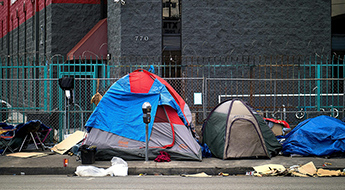Do Some Countries Discriminate More Than Others?
IPR sociologist Lincoln Quillian explores racial discrimination in labor markets
Get all our news
Do some countries discriminate against racial minorities in the hiring process more than others?
A new meta-analysis on hiring discrimination by IPR sociologist Lincoln Quillian and his colleagues finds evidence of pervasive hiring discrimination against all non-white groups in all nine countries they examined. Yet some countries discriminate more than others—and certain laws and institutional practices might explain why. The study was published in Sociological Science on June 17.

The researchers examined more than 200,000 job applications in nine different countries: Belgium, Canada, France, Germany, Great Britain, Netherlands, Norway, Sweden, and the United States.
“Clearly, there is a lot of discrimination against nonwhites in hiring in Western countries with a variety of negative effects,” Quillian said.
Quillian and his colleagues measured the level of discrimination by calculating the percentage of interview callbacks a white native person received compared to a person who is not white. France and Sweden had the highest levels of hiring discrimination, while the U.S., the Netherlands, and Germany had relatively lower levels.

In France and Sweden, minority applicants would need to send out 70–94 percent more resumes than white applicants to receive the same number of responses as white applicants. In Germany and the U.S., minority applicants would need to send out 25–40 percent more.
Though the U.S. has shown persistent hiring discrimination since 1990, certain laws and institutional practices explain why it had lower levels of discrimination than most of the other eight countries. More discussions about race and ethnicity take place in U.S. workplaces than in European ones, Quillian says.
“No other countries require monitoring of the racial and ethnic makeup of ranks of employees as is required for large employers in the U.S.,” Quillian said. “For instance, large employers in the U.S. are required to report race and ethnicity of employees at different ranks to the Equal Employment Opportunity Commission.”
In Germany, the country with the lowest level of racial discrimination in hiring among the nine studied, job applicants submit several documents in their applications, including high school grades and apprenticeship reports.
“We suspect that this is why we find low discrimination in Germany—that having a lot of information at first application reduces the tendency to view minority applicants as less good or unqualified,” Quillian said.
But in some countries with higher levels of hiring discrimination, like France, employers are forbidden from asking about an applicant’s race.
“The French do not measure race or ethnicity in any official—or most unofficial capacities, which makes knowledge of racial and ethnic inequality in France very limited and makes it difficult to monitor hiring or promotion for discrimination,” Quillian said.
The more information employers have about applicants, Quillian offers, the less room employers have to project their own views and stereotypes onto minority applicants.
Lincoln Quillian is professor of sociology and an IPR fellow. He presented this study at the British Academy in January.
Source: Quillian, L., A. Heath, D. Pager, A. H. Midtbøen, F. Fleischmann and O. Hexel. 2019. Do some countries discriminate more than others? Evidence from 97 field experiments of racial discrimination in hiring. Sociological Science 6(18), http://dx.doi.org/10.15195/v6.a18
Published: June 18, 2019.


